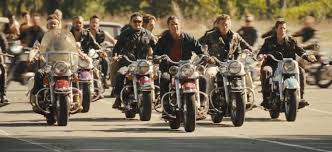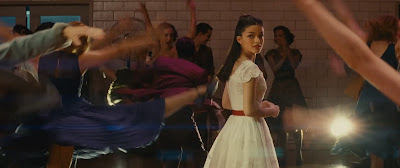The "Wisdom" of the Tribe ("Whatta Ya Got?")
or
"It'd Be Funny If It Weren't So Tragic..."
Look. I get it.
I blog about movies because I love it. So, of course, I joined a movie-loving-cluster of bloggers—The Large Association of Movie Blogs (I've participated in a podcast for them about this very movie) and there is comfort there. It's a joy to commiserate with other people—of other ages, of other backgrounds, from other countries—who share a love of movies. We all have opinions. Sometimes we don't agree, and you can ignore that or you can learn from the different perspective. It's all about the process of understanding this thing you love. There's safety there, too. Sometimes you can share something in those discussions that it would be a fool's errand to try to communicate with your family and friends. For most of them, "movies" is something to do on a date-night, or when you want to just 'veg'. The last thing they want to do is to study the film and try to find out why (or why not) it communicates its message. For others, that's like assigning yourself homework. For me, it's something I "gotta" do.
So, here's The Bikeriders, written and directed by Jeff Nichols. It's a movie about a motorcycle club—the Vandals MC —that operated (in its hey-day) between 1965 and 1973, and was immortalized by the picture book of the same name by Danny Lyons.
Sure. But, this is Jeff Nichols, one my favorites of the "younger" crop of directors, and his subjects are interesting, and if they're not box-office sure-things, they're at least interesting in the way he presents them. He made Mud, Take Shelter, Midnight Special, and Loving, all movies I'd recommend seeing (especially Loving) because of the way he tells stories so well. All his movies are about ostracized outsiders, and The Bikeriders is no exception.We first meet Benny (Austin Butler) quite a ways into the story, but this is like a thesis statement for the movie. He's sitting in a bar, smoking, drinking, minding his own business. Then two beefy "townies" walk into the bar and object to the fact that Benny is wearing "colors"—his motorcycle jacket—and suggest that he take it off. Benny—as in the way of movie bikers—looks from one of the guys to the others—clenches his jaw and says "You'd have to kill me to get this fuckin' jacket off." So, there's a fight, seeing as there's no negotiation between the parties. It starts in the bar, then goes outside. It's starts as a fistfight, then Benny pulls out a knife and slashes one of the guys' face, then the other grabs a shovel and swings it at his head.
Just before it connects—and it IS going to connect—Nichols freeze-frames and we begin the movie proper with an interview (we're still not at the beginning of the story) and Danny (Mike Faist) is talking to Kathy (Jodie Comer) about the incident and about her relationship to Benny and of how the Vandals came to be—Johnny (Tom Hardy), a blue collar worker with a wife and two kids, saw The Wild One on TV and, like so many others, liked the freedom of the lifestyle depicted (ignoring the underlying message) and formed the club. It was about how a bunch of outsiders formed a community of like-interests, ignoring the typical organizations like churches, PTAs, and Elks. The reason? They're all outsiders who wouldn't fit in those clans, so why not form their own? "What's not to like?" (which is as much of a nothing sandwich as "Whatta ya got?").The through-line of the movie is the passage of time and how the group changes, following Johnny's lead, which has some basic things like wearing the distressed leather jacket that serves as a uniform, and some arbitrary rules about being loyal to each other, and if there are any issues that are disagreed upon, they'll have a fight—"fists or knives" is the only specifics that need to be addressed—and whoever wins, gets their way, much in the way it worked in Black Panther (which sounded like a good system in that movie, but here smacks of "rule by minority").
While these things are going on, Johnny weighs the responsibility that being leader of such a group imposes on him, and Kathy realizes that Benny will always be conflicted whether to choose her or the club, even as that club faces challengers from a couple of fronts—the incoming Vietnam vets with chips on their shoulder and a disdain for authority and the young kids who see the power in numbers and want in on it. The "outlaw" mythology starts to get the better of the Vandals and it starts changing as time gets longer and meaner. It leaves Johnny with one of the few articulate insights in the movie: "You can give all you got to a thing" he tells Kathy at one point. "And it's always gonna do what it's gonna do" and it applies for Kathy to Benny and it applies for him to the club.
But, that's about it for depth. Things happen. Things get worse. And the vague rules of the club seem to go by the way-side as its reputation swells and new members begin to dilute its purpose and turn it into a gang. The rules don't apply to anybody anymore. And any good intentions are drowned out by bad behavior.
That's the gist of it. And as good as the performances are—although the actors' recreations of their characters' voices may produce giggles, they're based on Lyons' tapes of interviews with them—and as okay as the visuals are and as strenuously Nichols tries to recreate the books' look, it doesn't amount to much. One gets left with the impression that The Bikeriders is less about the gang than it is about Kathy's observations of them, and that's an outsiders' perspective (like, frankly, the guy who made the book). We see her struggle for the soul of Benny, but we really don't get to know him—he's a James Dean wanna-be—and the audience doesn't really get to know the Vandals—do they have jobs? how do they get the money for all that beer? They own a bar, sure, but there never seems to be anybody in it—because they're a bit of a mystery—and an antagonist—to Kathy. Like Brando's challenging non-answer of "Whaddaya got?" there's no "there" there. And the story of the Vandals is just another cautionary tale of what happens when you don't apply the brakes every once in awhile. Or check the gas-tank.If Nichols wanted to make a film of a picture book, he accomplished it. But, it's all captions with nothing between the lines and nothing between the pictures. The Bikeriders is more of a scrapbook than a fully fleshed-out movie, with a veneer of remove as he's trying to recreate what somebody already documented—"The Golden Age of motorcycle clubs"...but that age is long gone. Thomas Wolfe said you can never go home again. Apparently you can't make a movie of it, either.
But, Nichols is a fine director. This time he merely took a spill. And I look forward to his next one





























